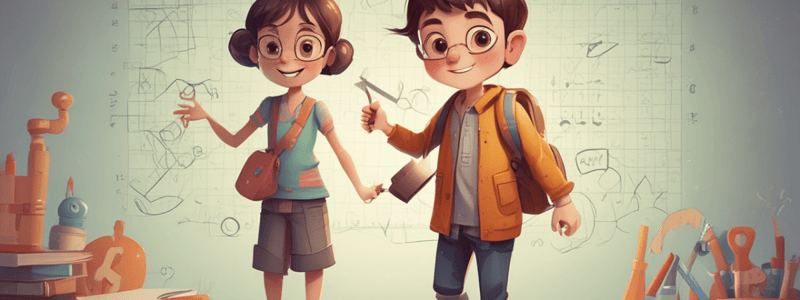Podcast
Questions and Answers
What is the main purpose of using manipulatives in learning?
What is the main purpose of using manipulatives in learning?
- To help children develop their fine motor skills
- To provide a hands-on experience of mathematical concepts (correct)
- To assess a child's prior knowledge of a subject
- To provide a fun and interactive way of learning
What is the main idea behind co-operative learning?
What is the main idea behind co-operative learning?
- Children learn best when they are given worksheets
- Children learn best when working in groups and helping each other (correct)
- Children learn best when they are taught by an expert
- Children learn best when working individually
According to Vygotsky's theory, what is the role of the teacher?
According to Vygotsky's theory, what is the role of the teacher?
- To be the sole authority in the classroom
- To provide individualized instruction to each child
- To provide worksheets and assignments for children to complete
- To act as a facilitator and provide guidance and support (correct)
What is the expected outcome of the maths tasks given to the group of girls in the case study?
What is the expected outcome of the maths tasks given to the group of girls in the case study?
What would be the best way for the primary school teacher to group the children in the case study?
What would be the best way for the primary school teacher to group the children in the case study?
What is the main difference between Piaget and Vygotsky's theories?
What is the main difference between Piaget and Vygotsky's theories?
What is the main purpose of the worksheet given to the children in the second case study?
What is the main purpose of the worksheet given to the children in the second case study?
What is the main benefit of using scaffolding strategies in learning?
What is the main benefit of using scaffolding strategies in learning?
What do we build up as we experience the world?
What do we build up as we experience the world?
What is the process of adding new experience or information to an existing cognitive structure called?
What is the process of adding new experience or information to an existing cognitive structure called?
What happens when there is an inconsistency between a learner's cognitive structure and the thing being learned?
What happens when there is an inconsistency between a learner's cognitive structure and the thing being learned?
How many stages of development do children go through, based on how they see the world and think?
How many stages of development do children go through, based on how they see the world and think?
What is the age range for the concrete operational stage?
What is the age range for the concrete operational stage?
What can babies do at the sensorimotor stage?
What can babies do at the sensorimotor stage?
What is the process of reorganizing thoughts when new information does not fit the schema called?
What is the process of reorganizing thoughts when new information does not fit the schema called?
At what age do children typically enter the formal operations stage?
At what age do children typically enter the formal operations stage?
What is a characteristic of children in the preoperational stage?
What is a characteristic of children in the preoperational stage?
What is the term for the inability to take another person's perspective?
What is the term for the inability to take another person's perspective?
At what age do children typically enter the concrete operational stage?
At what age do children typically enter the concrete operational stage?
What is a characteristic of children in the concrete operational stage?
What is a characteristic of children in the concrete operational stage?
What is the main difference between the preoperational and concrete operational stages?
What is the main difference between the preoperational and concrete operational stages?
What is the term for the ability to understand that other people have thoughts and feelings different from one's own?
What is the term for the ability to understand that other people have thoughts and feelings different from one's own?
What is a characteristic of children in the sensorimotor stage?
What is a characteristic of children in the sensorimotor stage?
What is the age range of children in the preoperational stage?
What is the age range of children in the preoperational stage?
What is the purpose of private speech according to Vygotsky's theory?
What is the purpose of private speech according to Vygotsky's theory?
What is the Zone of Proximal Development (ZPD) defined as?
What is the Zone of Proximal Development (ZPD) defined as?
Who introduced the instructional technique of scaffolding?
Who introduced the instructional technique of scaffolding?
What is the purpose of scaffolding in learning?
What is the purpose of scaffolding in learning?
What is the upper limit of the Zone of Proximal Development (ZPD)?
What is the upper limit of the Zone of Proximal Development (ZPD)?
What is an example of scaffolding in action?
What is an example of scaffolding in action?
What is the role of private speech in Vygotsky's theory?
What is the role of private speech in Vygotsky's theory?
What is the lower limit of the Zone of Proximal Development (ZPD)?
What is the lower limit of the Zone of Proximal Development (ZPD)?
What is cognition?
What is cognition?
Who is the Swiss psychologist known for his theory of cognitive development?
Who is the Swiss psychologist known for his theory of cognitive development?
What is the central idea of Piaget's constructivist theory?
What is the central idea of Piaget's constructivist theory?
What are the three basic components of Piaget's cognitive theory?
What are the three basic components of Piaget's cognitive theory?
What do schemas refer to in Piaget's cognitive theory?
What do schemas refer to in Piaget's cognitive theory?
What is the term used by Piaget to describe children's hypothesis-testing behavior?
What is the term used by Piaget to describe children's hypothesis-testing behavior?
What is the main focus of Piaget's research?
What is the main focus of Piaget's research?
What is the key aspect of Piaget's constructivist theory that differs from other learning theories?
What is the key aspect of Piaget's constructivist theory that differs from other learning theories?
Flashcards are hidden until you start studying
Study Notes
Scaffolding Strategies
- Scaffolding is an instructional technique that provides individualized support to learners based on prior knowledge.
- Introduced by Jerome Bruner, scaffolding involves changing the level of support to suit the cognitive potential of the child.
- Scaffolding maintains the potential level of development in the Zone of Proximal Development (ZPD).
Manipulatives
- A manipulative is an object designed to help learners perceive mathematical concepts through hands-on experience.
- Manipulatives provide a way for children to learn concepts through developmentally appropriate hands-on experience.
Co-operative Learning
- Co-operative learning involves children working in groups, helping each other, and learning from one another.
- This approach extends the idea of the teacher being the only person to help children learn.
The Role of the Teacher - Vygotsky
- According to Vygotsky's theory, the teacher's role is to provide scaffolding and support to help children learn.
- The teacher should adapt their plans to fit Vygotsky's theory, making them an expert on Vygotsky.
Piaget's Constructivist Theory
- Piaget's theory states that individuals construct their understanding, and learning is a constructive process (Active learning).
- Children are like scientists, testing and exploring hypotheses about the world by reflecting on their experiences.
Three Basic Components of Piaget's Cognitive Theory
- Schemas: the basic building blocks of cognitive models that enable us to form a mental representation.
- Adaptation processes: processes that enable learning and transition from one stage to another.
- Stages of development: all children develop through four stages based on how they see the world and think.
Stages of Development
- Sensorimotor stage (birth-2 years): children explore the world through senses and motor activity.
- Preoperational stage (2-7 years): children develop language and communication, imagine the future, and reflect on the past.
- Concrete operational stage (7-11 years): children develop abstract reasoning ability and can generalize from concrete examples.
- Formal operational stage (12-15 years): children think more logically and systematically.
Vygotsky's Social Constructivist Theory
- Vygotsky argued that language plays a crucial role in cognitive development.
- Private speech (talking to oneself) is the foundation of higher thinking, allowing children to plan, recall information, and solve problems.
- The Zone of Proximal Development (ZPD) is the range of tasks a child can complete with the assistance of a more capable instructor.
Case Study - Discussion
- A teacher can give maths tasks to students to complete together, encouraging interaction and discussion, which can improve their maths skills and confidence.
- A teacher can create groups based on students' knowledge levels, allowing those with more knowledge to help those with limited knowledge, ensuring all students learn as much as possible.
Studying That Suits You
Use AI to generate personalized quizzes and flashcards to suit your learning preferences.




